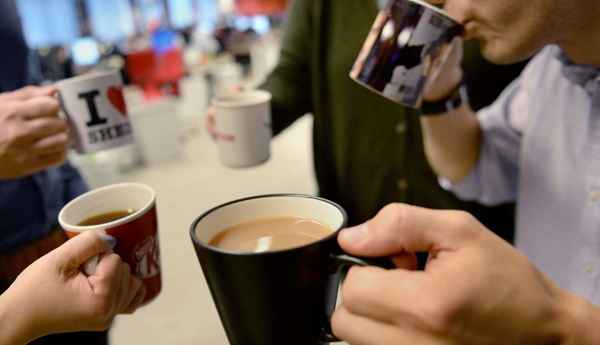
Coffee, Tea, Or Red Bull: What’s The Healthiest Way To Get Your Caffeine Fix?
So, what’s the best way to get that all-important caffeine hit? Should you sip it from tea or slam it in the form of a pull? Here, we weigh up the different sources of caffeine readily available in your work’s canteen, to see which is the healthiest way to get your fix…
Coffee
“Studies show that regularly drinking tea or coffee reduces the risk of developing type 2 diabetes,” says Dr Lucy Chambers, senior scientist at the British Nutrition Foundation, “but try to avoid adding sugar as this increases the risk of poor dental health and weight gain.”
As previously noted, coffee drinkers are putting themselves in a good position for a series of conditions that can creep up on us in our later years. For example, coffee drinkers have up to an 84pc lower risk of developing cirrhosis, a condition in which the liver is damaged.
Another plus for the black stuff is its weight loss credentials. Coffee boosts your metabolism, so it is often used as a stimulant before exercise to put the body in an energy-burning state. However, at the same time, the beans cause your body to increase the rate at which it secretes cortisol, which can lead to overeating and weight gain.
Coffee is also strong – often containing twice or more times the caffeine content of tea. And as too much caffeine can cause anxiety, the coffee drinker is encouraged to proceed with caution.
One last point is worth making here: coffee from the high street varies wildly in caffeine content. One cup might contain 90mgs, another 180mgs. The current daily safe limit for most people is set at 400mgs, so it’s easy to see how you can ‘OD’ if you don’t choose your cup carefully.
Builder’s tea
A strong tea probably has around 50mgs of caffeine, so you need to drink roughly double to get the same hit as a cup of coffee.
One obvious benefit of doing so is the milk you get in the process. While coffee is often consumed black, builders tea should be nice and milky – and therefore pumped full of lovely nutrients. Here, a word of caution: full fat milk can have hidden, unwanted consequences, says Chambers: “Adding milk provides you with calcium, iodine and B vitamins, but choose lower fat milks to reduce the amount of saturated fat in your diet”. Saturated fats have proven to raise the ‘bad’ cholesterol in your body, while putting you at higher risk of heart disease.
Interestingly, the caffeine in tea acts very differently in the body to the caffeine in coffee. “It’s not as fast releasing as the caffeine in coffee,” explains Lambert, “so you don’t get that sharp high that people get from coffee. The caffeine interacts with the amino acid L-theanine in tea so that when it hits our brain it sends it into relaxation mode.”
This means that even though tea doesn’t have as high a caffeine content as coffee, it is possibly a lot better option when you’re stuck in a stressful situation at the office.
Energy drinks
Roughly speaking, a can of Red Bull has about the same caffeine content as a cup of coffee – but it also has around 10 grams of sugar.
“Energy drinks can provide a lot of free sugars (the type of sugars that we all need to cut down on), so try to opt for the sugar-free versions,” says Chambers. “Some energy drinks have added B vitamins, but you can get these from foods such as fruit and vegetables, wholegrains, lean meat, nuts, pulses and lower fat dairy foods, which are more nutrient dense and an important part of a healthy, balanced diet”
There are also often a lot of additives in energy drinks. One of which is taurine, which has an antioxident role, can help heart health, and is associated with relaxation. “Some people suggest taurine can be more of a sedative than a stimulant,” reveals Lambert, “so it could actually slow your brain’s activity rather than speed it up.”
Green tea
Health gurus and Buddhist monks love this hot drink in equal measure, and it is number one on our list if you need a comfortable and safe caffeine buzz.
The caffeine content varies depending on the leaf, but is often around the 70mg per cup mark – somewhere between builder’s tea and coffee.
“Green and black teas contain polyphenols, such as flavanols and flavonols, which fine tune the functioning of cells and can protect against chronic health problem,” says Chambers.
Lambert is also a fan, explaining the myriad of health benefits the drink provides: “Green tea releases in the blood stream very slowly, even compared to breakfast tea. There’s a tea called matcha tea that people should be paying attention to. It’s like having a little immunity boost with the energy boost and it’s all natural.”
Win, win.
Chocolate Bar
One secret caffeine fix is the humble chocolate bar, which can contain about 10mg of the stimulant. Sure, that’s not as much as a cup of coffee or tea, but it might be enough to keep you awake at night, if you’ve eaten it as a treat late in the day.
Lambert suggests eating milk chocolate late in the evening if you really need some choccy gratification, as it is lower in caffeine than the darker stuff. However, that comes with its own downsides, as milky chocolate is often higher in processed sugar content.
If you’re having your treat earlier in the day, dark chocolate is the way to go. “Dark chocolate is high in the compound flavonoid, which is an anti-oxidant,” Lambert reveals. Studies have also shown dark chocolate to help lower blood pressure and reduce the risk of heart disease. A bar every now and again wouldn’t go amiss – but do keep an eye on the back of the packet, as studies show that your chocolate has to be 75 per cent plus in its cocoa percentage to get any of those health benefits.

